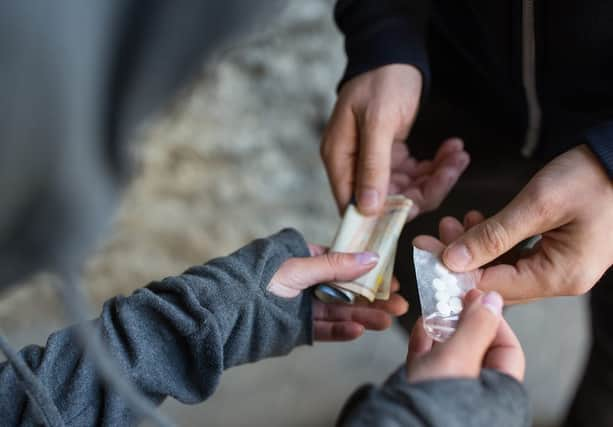Legalising drugs would boost economy, says researcher


Legalising cocaine and heroin would boost the economy by reducing the number of murders, according to new research.
The war on drugs fuels turf wars, violence among gangs and harms countries.
Advertisement
Hide AdAdvertisement
Hide AdAnd the violence affects financial growth rather than the industry itself, say scientists.
An analysis of 34 countries over a 20-year period found every additional killing per 100,000 inhabitants significantly lowered the premium paid to highly skilled workers.
This in turn decreased growth - lessening the incentive to acquire education and raising the chances of citizens joining drugs gangs.
The finding presented at the Royal Economic Society's annual conference in Brighton suggests increasing access to education may prove more effective than trying to tackle criminals by force.
Legalisation could reduce violence by vastly decreasing the profit margins the gangs stand to gain.
It would also curtail the resources they use to defend and expand their operations.
But this carries such political difficulties it's unlikely to be implemented any time soon, said the researchers.
Gang violence
Dr David Chivers, of Durham University, said violence is a result of rival gangs competing over routes and territories - and is fuelled by the large profits from trafficking.
Advertisement
Hide AdAdvertisement
Hide AdIt can decrease the skill premium through social unrest and disruption to education.
The TV series Narcos tells the true story of how the Colombian drug lord Pablo Escobar became one of the richest men in the world by trafficking cocaine.
He simply transported it to countries where there was a high demand and a low supply.
In 2004, Joaquín 'El Chapo' Guzman assassinated the leader of the Juarez Cartel to gain control of a key crossing point at the border with Texas.
This event would mark the start of the Mexican drug war - which would go on to claim the lives of over 60,000 people to date.
Using the murder rate as a proxy for overall violence within that country Dr Chivers and colleagues developed a computer model that showed government crackdowns are likely to worsen the problem by sparking even more violence.
When government neutralises a drug gang, it is often sparks a turf war among rival gangs.
Negative effects
Dr Chivers said: "The main finding of our analysis is that murders have negative affects on the skill premium.
Advertisement
Hide AdAdvertisement
Hide Ad"Our findings suggest one additional murder per 100,000 inhabitants leads to a decrease of 0.27 percentage points in the skill premium."
Countries offering high skill premiums are likely to grow faster due to the higher number and productivity levels of workers.
In addition, individuals have a higher incentive to acquire education and a lower incentive to join drug gangs, in order to ensure high earnings for themselves and their family.
Despite worldwide attention the illegal drug trade has been rarely analysed from a macroeconomic perspective.
Dr Chivers said: "Specifically we show drug trafficking diverts workers from the legal sector and reduces wages, the skill premium and the steady state value of aggregateoutput.
"Our model also provides a framework to explore the effectiveness of alternative policies to tackle drug trafficking such as scaling up the war on drugs, distributing subsidies to low income agents and legalisation."
During the first decade of the 21st century international organised crime accounted for over 1.5 per cent of global GDP - equivalent to $650 billion per year.
Profits from drug trafficking accounted for over half.
Criminal profits
Dr Chivers said: "The most profitable drugs to traffic are invariably cocaine and heroin.
Advertisement
Hide AdAdvertisement
Hide Ad"These drugs are often produced in low-income countries before being transported for sale in high-income countries."
To make 1kg of cocaine 350kgs of coca leaves are needed.
They are mostly grown in the parts of Bolivia, Peru and Brazil and transported to countries such as the US via Mexico.
Producers are paid around $385 for 1kg of cocaine.
Once traffickers sell to wholesale dealers in the US the price rises to $14,500. The street level dealer can sell this for $78,000.
Dr Chivers said: "As most is cut with cheaper substances the value of 100% pure cocaine is estimated to be worth around £122,000.
"This means for drug traffickers the mark-up for transporting a product is equivalentto around 3,800 per cent."
But in order to protect and obtain routes from rival gangs - as well as avoid being shut down by government forces - they must routinely engage in acts of violence and corruption, he said.